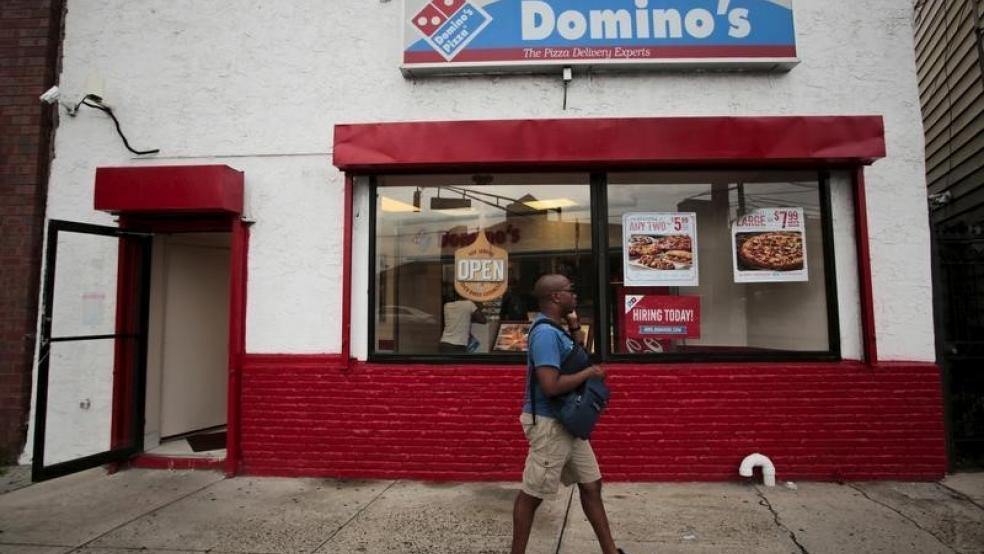Those seeking to understand why millions of Americans support Donald Trump’s anti-government positions need look no further than the power exercised by New York Attorney General Eric Schneiderman.
New York has been one of the slowest growing states for decades and Schneiderman apparently wants to keep it that way. On Tuesday, Schneiderman announced that he is suing Domino’s Pizza because he believes that 10 Domino’s franchise pizza stores in New York underpaid their workers. He alleges that the national company Domino’s is the joint employer of the workers employed by the franchises, and so they are responsible for the underpayment.
The suit is brought not against the restaurants that supposedly committed the offenses, but against the deep-pocket parent company, Domino’s. Businesses like Domino’s will be reluctant to invest in New York with the likes of Schneiderman abusing governmental power. Voters worried about the governmental abuse similar to that from Schneiderman are lining up to vote for candidates like Mr. Trump.
Related: The Crushing Cost of Regulation: $4 Trillion Since 1980
The franchises supposedly paid lower than minimum wages; did not pay the required overtime; abused the tip credit; and didn’t reimburse employees for the use of their cars and bicycles while delivering the pizza.
The Attorney General’s press release claims that the parent company Domino’s knew that the payroll reports generated by the company’s computer system were flawed, leading to underpayment. Furthermore, according to the suit, “the company played a role in the hiring, firing, and discipline of workers; pushed an anti-union position on franchisees; and closely monitored employee job performance through onsite and electronic reviews. “
Maybe. But blaming the parent company, rather than the franchise, is an attempt to destroy American franchised business.
New York State law holds that a company is a joint employer of a franchise business if it either has control, or has authority to control, employees of a franchise in a variety of ways. Since the nature of a franchisor is that it sets certain standards, including dress of employees and the look of the store, practically all franchised businesses will be potential targets of Schneiderman.
This suit is the logical extension of the National Labor Relations Board decision released in August in which the Board expanded the concept of “joint employers.” Now, it’s far easier for employees of franchised business to be classified as employees of the parent company.
Related: Tale of the Red Tape: $22 Billion in Savings from Cutting Ridiculous Regulations
The NLRB’s suit against McDonald’s USA opened in New York City in March. In that lawsuit, workers at 86 restaurants complained that they were unfairly disciplined in retaliation for communicating with unions, including facing threats, fewer work hours, and job loss. Although the charges could have been settled with the franchises for under $100,000, the NLRB chose to sue the parent company, a suit that is costing millions of dollars.
Under prior NLRB precedent, if a firm did not exercise authority over the employees of its subcontractors then it was not counted as an employer. Now the NLRB is saying that if a firm just possesses the authority to control its subcontractor’s employees—even if it does not use this authority—then it is a joint employer. This is similar to New York law.
Millions of franchises such as Jiffy Lube, Dunkin Donuts, or H&R Block are at risk of being told that they are joint employers with parent companies. What Schneiderman and the Board fail to note is that franchises are the most efficient way of providing some services. Franchises make it easier for people to start their own businesses, and independent contractors can move from one employer to another at will, or work for multiple employers at one time. The franchise model has dramatically expanded the number of small businesses in America.
Related: Obama’s Avalanche of New Regulations Can Cripple American Business
The NLRB is attacking McDonald’s; Schneiderman is attacking Domino’s. In addition, with its $15 minimum wage, New York is already disadvantaging its fast food operations. When big government is on the prowl, the loser ultimately is not business. The biggest losers are workers who will have fewer jobs and consumers who will have fewer inexpensive eating options.
Americans are not stupid. They see their neighbors and their own families struggling to make ends meet—yet government bureaucrats in Washington and Albany and state capitals across America have nothing better to do than try to put American pizza and burger restaurants out of business.
Ordinary Americans understand that the Schneidermans and the NLRB are trying to hurt them, not help them. Many of these ordinary Americans have had enough of big government bureaucrats and are voting for Donald Trump.






